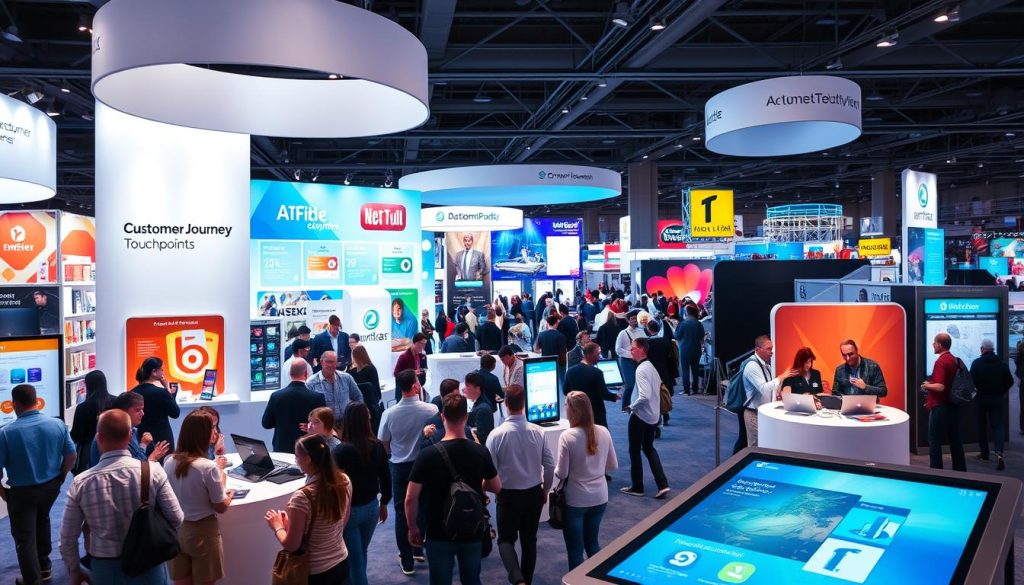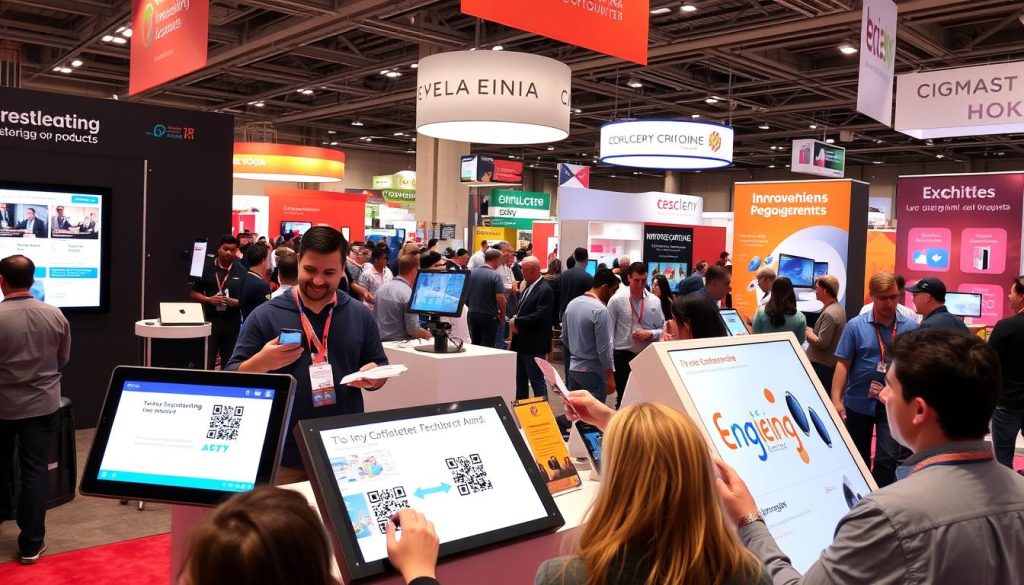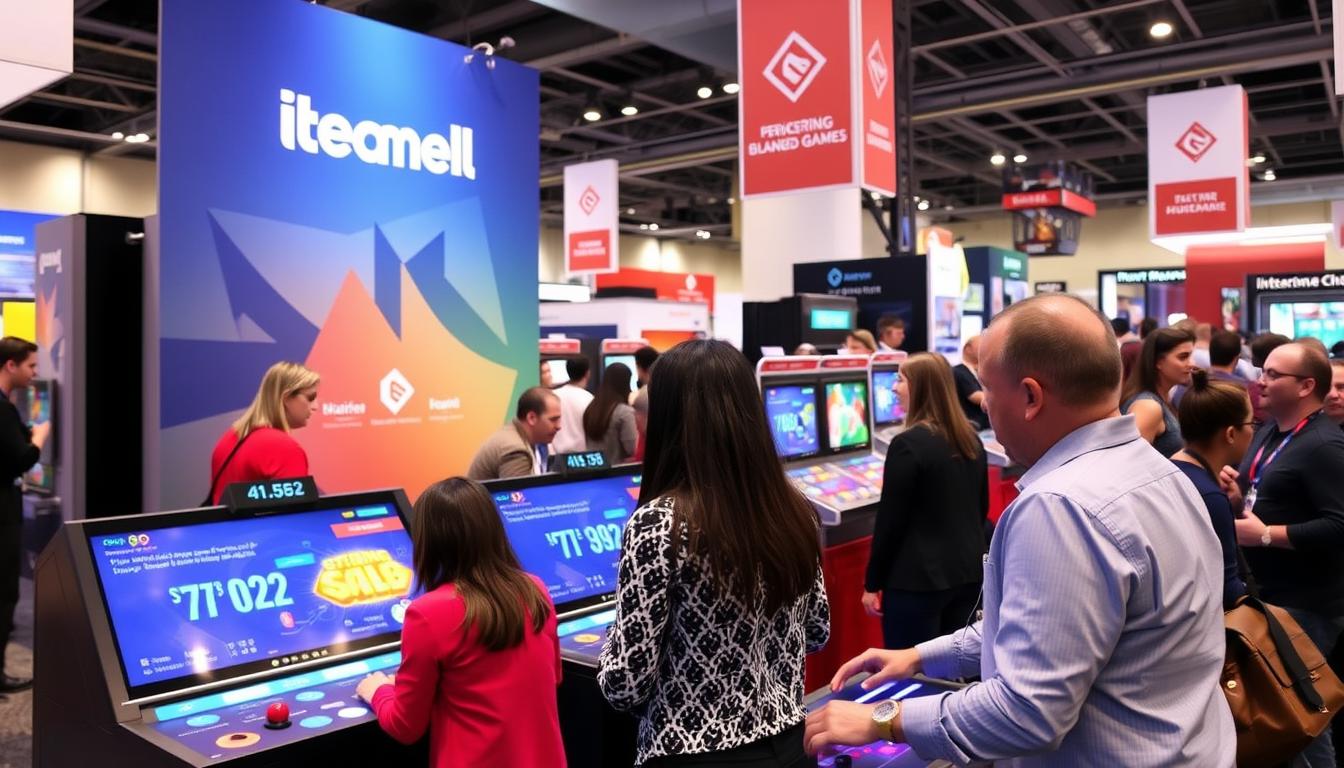Tradeshows have long been a staple of marketing strategies, but the game is changing. Enter branded games and interactive booth experiences, transforming how businesses engage potential clients. These innovative approaches are reshaping the landscape of lead generation, making waves in the world of experiential marketing.
The impact of branded games on tradeshow lead quality is significant. By incorporating gamification in marketing, companies are seeing a boost in engagement and lead quality. Attendees are more likely to interact with booths that offer fun, memorable experiences, leading to better conversations and higher-quality leads.
Interactive booth experiences go beyond traditional handshakes and business card exchanges. They create immersive environments where potential clients can engage with your brand in meaningful ways. This deeper level of interaction often results in leads that are more informed, interested, and likely to convert.
Key Takeaways
- Branded games boost engagement at tradeshows
- Interactive experiences lead to higher-quality leads
- Gamification enhances memorability of booth interactions
- Immersive environments foster deeper brand connections
- Innovative approaches improve lead conversion rates
Understanding Lead Quality Fundamentals in Modern Marketing
In today’s digital landscape, mastering Lead Generation Tactics is crucial for business success. The quality of leads can make or break your marketing efforts. Let’s dive into the essentials of lead quality and how it shapes modern marketing strategies.
Defining High-Quality Leads in Today’s Market
High-quality leads are potential customers who show genuine interest in your product or service. They match your ideal customer profile and have a higher likelihood of converting. GoHighLevel’s campaign management tools can help identify these valuable prospects efficiently.
Key Indicators of Lead Quality
To gauge lead quality, marketers look at several factors:
- Engagement level with your content
- Fit with your target audience criteria
- Stage in the buying process
- Budget and decision-making authority
The Evolution of Lead Generation Strategies
Lead generation has come a long way. Traditional methods like cold calling have given way to more sophisticated approaches. Today’s strategies focus on creating valuable content and optimizing Customer Journey Touchpoints. This shift has led to more targeted and effective lead generation.
| Past Strategies | Current Strategies |
|---|---|
| Mass email blasts | Personalized email campaigns |
| Generic advertising | Targeted social media ads |
| Trade show booth presence | Interactive virtual events |
By understanding these fundamentals, businesses can refine their approach to lead generation. Focusing on quality over quantity leads to better conversion rates and more efficient marketing spend. Remember, the goal is to attract leads that are most likely to become loyal customers.
“The best leads are those who see value in your offering before you even reach out to them.”
Implementing advanced tools like GoHighLevel’s email marketing features can significantly enhance your lead quality assessment and nurturing processes.
The Impact of Branded Games on Tradeshow Lead Quality
Branded games are revolutionizing lead generation at tradeshows. These interactive experiences offer a unique twist on traditional Brand Engagement Techniques, capturing attention and valuable data simultaneously. By blending entertainment with marketing, companies create memorable touchpoints that resonate with potential clients.
Experiential Marketing Strategies like branded games yield higher-quality leads. They provide insights into attendees’ interests, pain points, and decision-making processes. This depth of information enables sales teams to tailor their follow-ups effectively, increasing conversion rates.
“Gamification at tradeshows isn’t just fun; it’s a powerful tool for qualifying leads and enhancing brand recall,” says marketing expert Jane Smith.
The benefits of using branded games include:
- Increased booth dwell time
- Enhanced data collection opportunities
- Improved lead scoring capabilities
- Greater brand memorability
By integrating game mechanics with lead capture systems, businesses can track engagement levels and prioritize follow-ups. This strategic approach transforms casual booth visitors into qualified prospects, maximizing the return on tradeshow investments.
| Metric | Traditional Booth | Booth with Branded Game |
|---|---|---|
| Average Engagement Time | 2 minutes | 8 minutes |
| Lead Quality Score | 6/10 | 8.5/10 |
| Follow-up Response Rate | 15% | 35% |
As tradeshows evolve, branded games stand out as a cornerstone of innovative lead generation. They offer a win-win scenario: attendees enjoy an engaging experience, while exhibitors gather rich, actionable data to fuel their sales pipelines.
Leveraging Gamification for Enhanced Lead Generation
Gamification in marketing has revolutionized lead generation tactics. By incorporating game elements into marketing strategies, businesses can boost engagement and collect valuable leads. Let’s explore how gamification drives results in lead generation campaigns.
Game Mechanics that Drive Engagement
Effective game mechanics can significantly enhance lead generation efforts. Points, badges, and leaderboards create a sense of achievement and competition. Challenges and quests motivate users to complete desired actions. These elements make lead capture more enjoyable and increase participation rates.
Psychological Triggers in Interactive Experiences
Interactive experiences tap into powerful psychological triggers. The desire for rewards activates the brain’s pleasure centers. Social proof influences behavior when users see others participating. Progress bars create a sense of investment, encouraging users to complete lead forms. Leveraging these psychological principles can dramatically improve lead quality and quantity.
Measuring Gamification Success Metrics
To gauge the effectiveness of gamified lead generation tactics, track key metrics:
| Metric | Description | Target |
|---|---|---|
| Participation Rate | Percentage of visitors who engage with the game | 50%+ |
| Completion Rate | Percentage of participants who finish the game | 75%+ |
| Lead Conversion Rate | Percentage of participants who become qualified leads | 25%+ |
| Lead Quality Score | Average quality rating of generated leads | 8/10+ |
By analyzing these metrics, marketers can refine their gamification strategies and optimize lead generation campaigns for better results. Gamification offers a powerful tool for engaging prospects and capturing high-quality leads in today’s competitive market.
Creating Memorable Booth Experiences Through Interactive Elements
Tradeshows offer a unique chance to make lasting impressions. By crafting Interactive Booth Experiences, brands can captivate attendees and generate high-quality leads. The key lies in blending creativity with technology to create unforgettable moments.
One effective strategy is to incorporate interactive games. These not only entertain but also educate visitors about your products or services. For example, a virtual reality simulation can showcase your offerings in an immersive way, leaving a strong impact on potential clients.
Another powerful tool is personalized interactions. Use touchscreen displays to let visitors explore your catalog at their own pace. This self-guided approach respects their time while providing valuable information.
Live demonstrations are crucial in Experiential Marketing Strategies. They bring your products to life, allowing attendees to see, touch, and understand their value firsthand. This hands-on approach often leads to deeper engagement and better-quality leads.
“Interactive experiences create emotional connections, turning casual visitors into potential long-term customers.”
Don’t forget the power of social media integration. Set up a photo booth with your branding and encourage visitors to share their experience online. This extends your reach beyond the event and creates opportunities for follow-up engagement.
Remember, the goal is to create a memorable experience that resonates long after the event ends. By combining these interactive elements, you’ll not only attract more visitors but also generate higher-quality leads that are more likely to convert.
Implementing Advanced Lead Scoring Systems
Lead scoring systems play a crucial role in maximizing trade show success. By implementing sophisticated methods, businesses can effectively target high-potential prospects and boost conversion rates. Let’s explore key components of advanced lead scoring for trade show environments.
Behavioral Scoring Models
Behavioral scoring models analyze visitor actions at your booth. These models track interactions with branded games, product demonstrations, and staff conversations. By assigning points to specific behaviors, you can identify engaged prospects more likely to convert.
Demographic Qualification Criteria
Demographic data helps refine lead scoring metrics. Consider factors like job title, company size, and industry when evaluating leads. This information allows for precise trade show visitor targeting, ensuring your team focuses on the most promising prospects.
Engagement Level Assessment
Measuring engagement levels provides valuable insights into lead quality. Track metrics such as time spent at your booth, participation in interactive activities, and follow-up requests. Higher engagement often correlates with increased conversion potential.
| Scoring Component | Example Criteria | Point Value |
|---|---|---|
| Behavioral | Completed branded game | 10 |
| Demographic | C-level executive | 15 |
| Engagement | Requested follow-up meeting | 20 |
By combining these advanced lead scoring techniques, you’ll enhance your ability to identify and prioritize high-quality leads at trade shows. This targeted approach leads to more efficient follow-ups and improved conversion rates.
Optimizing Customer Journey Touchpoints at Tradeshows

Tradeshows offer unique opportunities to enhance Customer Journey Touchpoints. By strategically planning your booth layout and activities, you can create a seamless experience that guides attendees through their decision-making process.
Start by mapping out key touchpoints where visitors interact with your brand. This includes initial attraction, engagement, information exchange, and follow-up. Each stage should incorporate Brand Engagement Techniques that resonate with your target audience.
- Attraction: Eye-catching displays and interactive demos
- Engagement: Branded games and personalized conversations
- Information Exchange: Digital lead capture and product demonstrations
- Follow-up: Automated email sequences and personalized outreach
Integrating branded games into your tradeshow strategy can significantly boost engagement and lead quality. These interactive experiences create memorable touchpoints that encourage visitors to spend more time at your booth and provide valuable information about their needs and preferences.
“Effective Customer Journey Touchpoints at tradeshows transform casual visitors into qualified leads and potential long-term customers.”
To optimize your tradeshow presence, focus on creating a cohesive experience that guides attendees from initial interest to meaningful engagement. By aligning your Brand Engagement Techniques with each stage of the customer journey, you’ll maximize the impact of your tradeshow participation and generate higher-quality leads.
Analyzing Booth Traffic Patterns and Conversion Rates
Effective Booth Traffic Analytics can revolutionize your tradeshow strategy. By understanding visitor flow and engagement, you can refine your Lead Generation Tactics for better results.
Traffic Flow Analytics
Tracking visitor movement helps optimize booth layout. Use heat maps to identify high-traffic areas and position key displays accordingly. This data-driven approach enhances visitor experience and increases engagement opportunities.
Engagement Duration Metrics
Measure how long visitors interact with your booth elements. Longer engagement often signals higher interest. Use these insights to refine your presentations and improve lead management strategies.
Conversion Rate Optimization
Track which booth elements lead to conversions. Test different layouts, messaging, and interactive features to boost your conversion rates. Remember, small improvements can yield significant results over time.
| Metric | Before Optimization | After Optimization | Improvement |
|---|---|---|---|
| Average Engagement Time | 3 minutes | 5 minutes | 67% increase |
| Lead Capture Rate | 20% | 35% | 75% increase |
| Qualified Lead Conversion | 5% | 12% | 140% increase |
By focusing on these key areas, you can transform your booth into a Lead Generation Tactics powerhouse. Continuous analysis and refinement of your Booth Traffic Analytics will drive ongoing improvements in your tradeshow performance.
Integration of Digital and Physical Lead Capture Methods

In today’s fast-paced trade show environment, combining digital and physical lead capture techniques is crucial for success. This approach enhances Lead Generation Tactics and improves Trade Show Visitor Targeting. By blending traditional methods with cutting-edge technology, businesses can gather more comprehensive data and boost their lead quality.
Digital lead capture tools, such as mobile apps and QR codes, allow for quick and efficient data collection. These technologies enable seamless information exchange, reducing queue times and improving visitor experience. On the other hand, physical methods like business card exchanges and printed forms still hold value, especially for attendees who prefer tangible interactions.
Integrating both approaches creates a synergy that caters to diverse preferences. For instance, a lead generation strategy might involve using digital games at your booth to attract visitors, while also offering physical brochures for those who want to take information home.
“The key to successful lead capture is understanding your audience and providing multiple touchpoints for engagement.”
To maximize the benefits of this integrated approach, consider these strategies:
- Use QR codes on physical materials to bridge the gap between print and digital
- Implement real-time data syncing between digital and physical lead capture methods
- Train staff to guide visitors through both digital and traditional engagement options
- Analyze data from all sources to refine your Trade Show Visitor Targeting
By embracing this holistic approach, businesses can create a more robust lead generation system that captures high-quality leads and provides valuable insights for future marketing efforts.
Measuring ROI Through Enhanced Lead Quality Metrics
Measuring the return on investment (ROI) of branded games at tradeshows is crucial for assessing their impact on lead quality. By focusing on Lead Scoring Metrics, businesses can gauge The Impact of Branded Games on Tradeshow Lead Quality and make data-driven decisions.
Key Performance Indicators
To evaluate the success of branded games, consider these KPIs:
- Engagement rate
- Lead conversion rate
- Average deal size
- Sales cycle length
Long-term Value Assessment
Assessing long-term value involves tracking leads over time. Creating effective drip campaigns can help nurture leads and measure their ongoing value to your business.
ROI Calculation Models
Use these models to calculate ROI based on improved lead quality:
| Model | Formula | Best For |
|---|---|---|
| Simple ROI | (Revenue – Cost) / Cost | Quick estimates |
| Customer Lifetime Value | (Average Purchase Value x Purchase Frequency x Customer Lifespan) – Acquisition Cost | Long-term projections |
| Lead Velocity Rate | ((Qualified Leads Month 2 – Qualified Leads Month 1) / Qualified Leads Month 1) x 100 | Growth rate analysis |
By implementing these Lead Scoring Metrics and ROI models, you can accurately measure The Impact of Branded Games on Tradeshow Lead Quality and optimize your marketing strategies for better results.
“Effective ROI measurement is the key to unlocking the true potential of branded games in lead generation.”
Future Trends in Experiential Marketing and Lead Generation
The landscape of experiential marketing strategies is evolving rapidly. As we look ahead, we see a fusion of cutting-edge technology and human-centered design shaping the future of lead generation at tradeshows and events.
Virtual and augmented reality are set to transform booth experiences. Imagine attendees stepping into immersive product demonstrations or exploring virtual showrooms. These technologies will create memorable interactions, boosting lead quality and engagement.
Gamification in marketing continues to grow. We’re seeing a shift towards more sophisticated, personalized games that adapt to individual preferences. These smart games will capture valuable data, providing deeper insights into potential leads.
Artificial intelligence will play a crucial role in real-time lead scoring. AI-powered systems will analyze attendee behavior, predicting which leads are most likely to convert. This allows for immediate, targeted follow-ups, maximizing conversion rates.
| Trend | Impact on Lead Generation | Adoption Timeline |
|---|---|---|
| VR/AR Experiences | Higher engagement, better qualified leads | 1-3 years |
| AI-Powered Lead Scoring | Improved lead quality, faster conversions | Already emerging |
| Personalized Gamification | Deeper insights, increased data collection | 2-4 years |
As these trends unfold, marketers must stay agile. The key to success will be balancing innovative technologies with authentic human connections. By embracing these future-forward experiential marketing strategies, businesses can expect to see significant improvements in lead quality and overall marketing ROI.
Conclusion
Branded games have revolutionized tradeshow lead quality, transforming booth interactions into memorable experiences. These interactive elements capture attention and provide valuable data, enhancing lead scoring and qualification processes. By integrating gamification, exhibitors create engaging touchpoints that resonate with attendees long after the event ends.
The impact of branded games on tradeshow lead quality extends beyond initial interactions. They foster deeper connections between brands and potential customers, leading to higher-quality leads and improved conversion rates. Interactive booth experiences encourage active participation, allowing exhibitors to gather rich insights into visitor preferences and behaviors.
As tradeshows evolve, the fusion of digital and physical lead capture methods becomes crucial. Branded games bridge this gap, offering a seamless blend of entertainment and data collection. By leveraging these innovative strategies, companies can maximize their ROI and stay ahead in the competitive landscape of experiential marketing.






